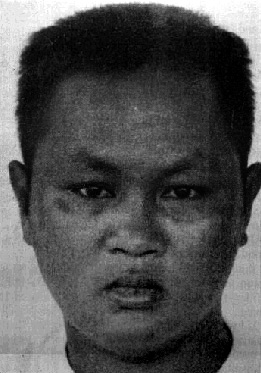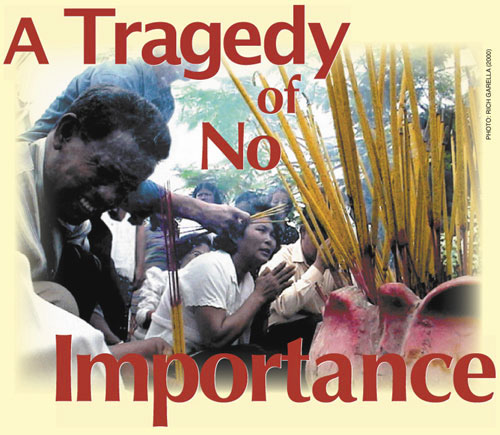Contents
Brazil, whose real name was Kong Samreth, was once known as a local hood who worked out of a noodle shop near a high school just south of downtown. Students hired him to beat up their romantic rivals. He joined the army in 1990, at the age of 20 or 21. By 1992, he was a second lieutenant, and his unit had a new commander: Hing Bun Heang.
 “Brazil”
“Brazil”
About A Tragedy of No Importance
This article was researched and written by Rich Garella and Eric
Pape. Both of us lived in Cambodia at the time of the grenade attack and
came to know many of the people affected by it. We saw what happened to
the ambitious effort to bring democracy and development to Cambodia,
and learned how the West chooses, finances and inoculates its winners,
and what happens when it abandons its losers.
The authors
 |
Rich Garella is a journalist whose writing has been published in Los Angeles magazine, the LA Weekly, IPI Global Journalist and others and a consultant who has worked for MoveOn.org and other organizations. His short film Polygraph
was chosen from among more than 1000 entries as a finalist in MoveOn’s
“Bush in 30 Seconds” contest and was shown widely on U.S. television in
2004.
Garella lived in Cambodia from 1995 to 1997, working as an editor at The Cambodia Daily and later as executive editor at the short-lived Cambodia Today/Kampuchea Tngay Nih (shut down after the 1997 coup d’etat) before returning to the United States.
Drawn by the disintegrating political climate, he went back to
Cambodia in 1998 to work as communications officer for Cambodia’s
opposition leader, Sam Rainsy for ten months; in 2000 to research this
article; and in 2003 as a consultant to the International Republican
Institute during parliamentary elections.
As a founder of Loud Mouth Films, he produced the Peabody Award–winning documentary film Who Killed Chea Vichea?, released in 2011.
 |
Eric Pape worked as a journalist for The Cambodia Daily from 1996 until 1997 and for the Phnom Penh Post
during the run-up to the 1998 elections. His writing there focused on
human rights abuses, politics, international involvement in Cambodia,
and the electoral process.
Pape has also worked as a journalist in Europe, Africa, and Latin
America, where he wrote about international politics, war crimes, drugs
and trafficking. In the US, his articles have focused on exiled ethnic
groups, the criminal justice system and politics.
He has written for Foreign Policy, the Daily Beast, Newsweek International, The Los Angeles Times Magazine, Spin magazine, Los Angeles magazine, the LA Weekly, London’s Independent on Sunday, Salon, and other publications and wire services in Asia, Europe and the Americas.
He is now based in Paris.
Cambodia: Hun Sen Promoting, Rewarding Killers
Human Rights Watch | 12 Nov. 2012
The 68-page report, “‘Tell Them That I Want to Kill Them’: Two Decades of Impunity in Hun Sen’s Cambodia,” documents key cases of unsolved killings of political activists, journalists, opposition politicians, and others by Cambodian security forces since the 1991 Paris Agreements, which were signed by 18 countries, including the five permanent United Nations Security Council members. The Paris Agreements and the subsequent United Nations (UN) peacekeeping mission were supposed to usher in a new era of democracy, human rights, and accountability in Cambodia. More than 300 people have been killed in politically motivated attacks since then, yet not one case has resulted in a credible investigation and conviction.
The report’s title is a quote from Hing Bun Heang, then deputy chief of Hun Sen’s bodyguard unit, in response to a journalist’s question about his alleged role in the killing of at least 16 people in a coordinated grenade attack on opposition leader Sam Rainsy in March 1997. The UN and the US Federal Bureau of Investigation (FBI) implicated the bodyguard unit in the attack and identified Hing Bun Heang as being in operational control. Hing Bun Heang was later promoted to the rank of lieutenant general and is now deputy commander-in-chief of the Royal Cambodian Armed Forces.

លោក ហ៊ីង ប៊ុនហៀង [Hing Bun Heang]បដិសេធ នឹងព័ត៌មាន ថា, អង្គរក្ស ចូលរួម បាតុកម្ម ទម្លាក់លោក កឹម សុខា | Hing Bun Heang rejects accusation that bodyguard unit participated in demonstration for Kem Sokha to step down

លោក ហ៊ីង ប៊ុនហៀង សុំទោស ពលរដ្ឋ ករណី កងអង្គរក្ស បានផឹកស៊ី ប៉ះទង្គិច បាញ់បោះ | Hing Bun Heang apologizes to public for bodyguards' drunken unruly acts




មកដល់ថ្ងៃនេះហើយ ដូចគ្មានឮថាចាប់កូនឆ្កែណាមួយផង តើបានន័យម្តេចទៅ? នេះហើយ ហ៊ុន សែន មិនស្រួលដើរចាប់ អ្នកដែលថតរូបពួកដែលវ៉ៃគេនោះ ទៅដាក់គុកផងក៍មិនដឹង បើសង្រ្គោះជាតិ គេតាមចាប់ដាក់គុក ហើយខ្លះថាកពត់ជាតិទៀត បងប្អូនឮពួកគេថាទេ នេះមិនមែនរឿងធុំដុំទេ ព្រោះគ្មានអ្នកណាស្លាប់ផង ហា ហា ចុះកាលពីមុនមានដែលសង្រ្គោះជាតិវ៉ៃពួកដែលមិនមានក្របខណ្ឌ័ ផង ម្តេចក៍ថារឿងវាធំម្លេះ ចាប់ដាក់គុកតាមចិត្ត ខ្ញុំថាប្រជាជនដូចជាមិនឡប់ទេ មើលទៅដូចជាគេដឹងអ្វីជាខ្មៅឬសរដែរ ខំនិយាយការពារខ្ឡនទៅ។
ReplyDelete